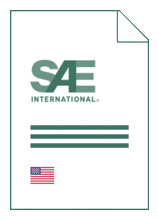
Standard [CURRENT]
SAE J 1747:2013-05-14
Recommended Methods for Conducting Corrosion Tests in Hydrocarbon Fuels or Their Surrogates and Their Mixtures with Oxygenated Additives
- Publication date
- 2013-05-14
- Original language
- English
- Pages
- 7
- Publication date
- 2013-05-14
- Original language
- English
- Pages
- 7
Product information on this site:
Quick delivery via download or delivery service
Buy securely with a credit card or pay upon receipt of invoice
All transactions are encrypted
Short description
This SAE Recommended Practice presents standardized test methods developed for use in testing with hydrocarbon fuels or their surrogates and those same fuels when blended with oxygenated fuel additives. Hydrocarbon fuels include Gasoline and Diesel fuel or their surrogates described in SAE J1681. Oxygenated additives include Ethanol, Methanol Methyl Tertiary Butyl Ether (MTBE) and Fatty Acid Methyl Esters (FAME or Biodiesel). Corrosion testing of metals has a long and varied history. In spite of the problems inherent in extrapolating results of accelerated tests on standard specimens to actual field durability, engineers have been able, to a large extent, to rely on these results in making materials selection decisions. However, these tests have generally employed aqueous media and not strictly applicable to the use of organic chemical media. Fuel blends with oxygenates tend to exhibit high electrical conductivity relative to straight hydrocarbon fuels, thus the relevance of the historical database for aqueous corrosion is lost. Therefore, to allow rapid build-up of a new database, several corrosion test procedures have been reviewed and amended where appropriate.
Loading recommended items...
Loading recommended items...
Loading recommended items...
Loading recommended items...

